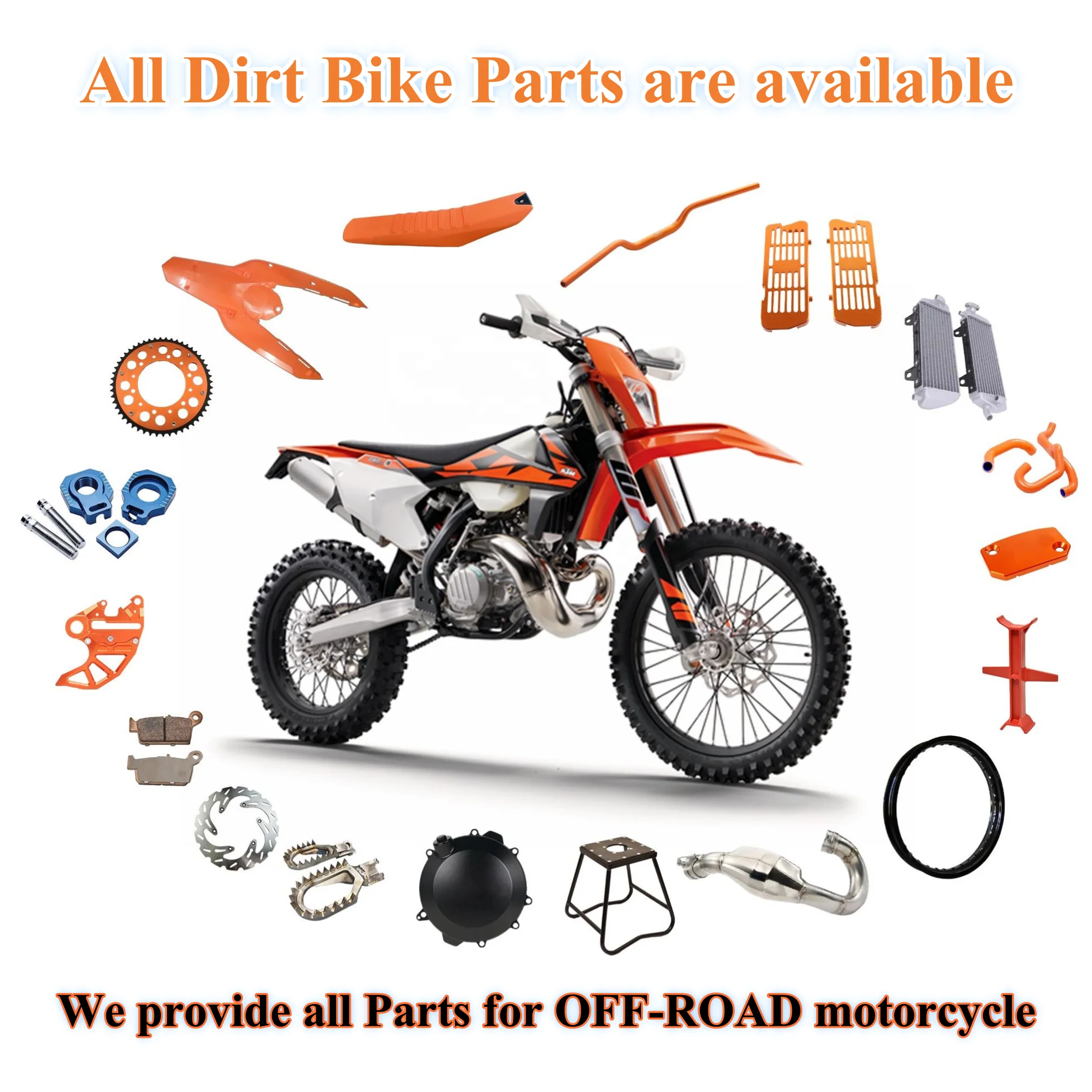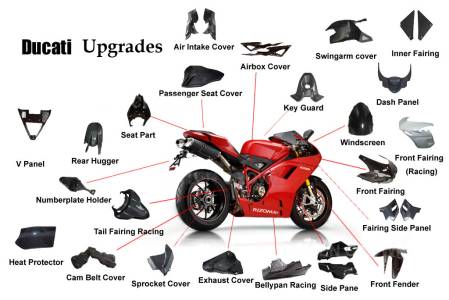What Makes High-Grade Motorcycle Parts Auckland Essential for Daily Commuters
What Makes High-Grade Motorcycle Parts Auckland Essential for Daily Commuters
Blog Article
Discover the Essential MotorBike Components You Need for Optimum Efficiency
Understanding the crucial parts of a motorcycle is basic for achieving peak performance. Each component, from the engine to the braking system, plays an important function in total functionality and safety. Routine maintenance can prevent unanticipated failings and boost the riding experience. Many cyclists forget the ins and outs of these systems. Uncovering exactly how they function together can bring about an extra reliable trip. What important elements should every rider focus on?
The Engine: The Heart of Your Motorbike
The engine serves as the core element of a bike, driving its efficiency and defining its capabilities. It is in charge of converting fuel right into power, which powers the bike forward. Different sorts of engines are used, consisting of single-cylinder, V-twin, and inline arrangements, each offering distinctive attributes matched for different riding functions and designs. The engine size, normally measured in cubic centimeters (cc), considerably affects efficiency, with bigger engines generally giving more power and torque.Furthermore, the engine's style and modern technology, such as fuel injection systems or air-cooling versus liquid-cooling, affect performance and dependability. Upkeep is vital for peak procedure; variables like normal oil modifications and monitoring ignition system assurance longevity. Motorcyclists commonly think about an engine's responsiveness and level of smoothness, as these qualities boost the total riding experience. Inevitably, the engine remains a crucial component that defines not only the bike's efficiency but also the motorcyclist's connection to the equipment.
The Transmission: Changing Gears Efficiently
The transmission plays an important role in a motorbike's efficiency, particularly in the technicians of equipment moving. Understanding how to change gears smoothly can boost the overall riding experience, while normal maintenance warranties peak functionality. Appropriate interest to these facets can considerably influence the long life and efficiency of the bike.

Gear Shifting Mechanics
Smooth gear moving is necessary for optimal motorbike efficiency, significantly influencing both velocity and control. The technicians of equipment changing involve the communication between the clutch, gear bar, and transmission system. When a motorcyclist involves the clutch, it disengages the engine from the transmission, permitting an equipment modification without harming the components. A well-timed release of the clutch, combined with specific activity of the equipment lever, helps with a seamless adjustment between equipments. This process ensures that the engine runs within its finest power band, boosting performance. Bike Parts Wellington. Furthermore, understanding the equipment proportions and their effect on speed and torque can help cyclists make informed choices during shifts, ultimately contributing to an extra responsive and delightful riding experience
Maintenance Tips Value
Regular maintenance plays an essential function in guaranteeing that the transmission system operates successfully, enabling for smooth gear changes. Frequently examining and transforming the transmission liquid is vital, as old fluid can result in boosted rubbing and wear. Additionally, evaluating the clutch for wear assurances peak engagement and disengagement, protecting against slippage throughout equipment changes. Lubrication of relocating parts is just as essential to decrease rubbing and improve efficiency. Motorbike owners must likewise keep track of for leaks and uncommon noises, as these can indicate underlying issues. By adhering to these upkeep tips, motorcyclists can extend the life-span of their transmission system, assuring that gear shifts stay smooth and adding to the total efficiency of their motorbike.
The Braking System: Ensuring Safety on Every Adventure
Braking systems are fundamental elements that directly affect a motorbike's safety and performance. They contain different components, including brake pads, rotors, calipers, and hydraulic lines, all working together to assure effective deceleration. The type of stopping system-- commonly either disc or drum-- impacts responsiveness and quiting power.Regular upkeep is necessary to copyright peak performance; used brake pads can lead to lowered performance and increased quiting ranges. Additionally, the quality of brake liquid must be monitored, as it can take in moisture in time, compromising stopping efficiency.Riders ought to likewise think about the value of anti-lock braking systems (ABDOMINAL), which stop wheel lockup throughout sudden quits, boosting general security. Properly operating brakes are not nearly stopping; they instill self-confidence in the rider, enabling much safer navigating via different terrains. Inevitably, a trustworthy braking system is essential for enjoying every ride with comfort.
The Suspension: Enhancing Comfort and Control
A well-functioning suspension system substantially adds to a motorcycle's total performance, enhancing the performance of the stopping system. The suspension plays a significant function in soaking up shocks from irregular surfaces, ensuring a smoother trip while preserving tire contact with the roadway. This contact is important for both stability and control, enabling motorcyclists to navigate edges with confidence and precision.Different kinds visit this website of shock absorber, such as telescopic forks or mono-shocks, provide varying degrees of convenience and handling. Correctly tuned suspension boosts responsiveness, providing the cyclist with a much more linked feeling to the motorbike. Regular maintenance checks are very important to identify the suspension parts, consisting of springs and dampers, are functioning at their finest. A reliable shock absorber not just boosts the riding experience however also adds to the long life of various other motorbike components by reducing deterioration. As an outcome, buying high quality suspension is important for home any kind of serious motorbike enthusiast.
The Tires: Connecting You to the Roadway
Tires play a necessary function in a motorcycle's performance, serving as the main web link between the rider and the road. Comprehending the various sorts of tires readily available can substantially affect managing and safety. Furthermore, regular maintenance is vital to assure peak tire efficiency and long life.
Tire Keys In Explained
Exactly how do different tire types influence a motorbike's efficiency? Tire kinds play a crucial duty in determining a motorcycle's handling, security, and grasp. Sport tires, designed for high efficiency, deal boosted traction and responsiveness on paved roads, making them optimal for racing and aggressive riding. Conversely, touring tires focus on longevity and convenience, giving a smoother experience for long-distance travel. Off-road tires, identified by their rugged step patterns, master grip on unpaved surface areas, ideal for adventure fanatics. Additionally, dual-sport tires mix characteristics from both off-road and on-road groups, accommodating versatile riding requirements. Inevitably, choosing the best tire kind is important for enhancing performance, making sure safety and security, and enhancing the total riding experience.
Upkeep Tips Offered
While riding on the roadway, maintaining optimal tire condition is crucial for safety and security and efficiency. Regularly examining tire stress is important, as under-inflated tires can lead to poor handling and increased wear. It is a good idea to inspect tread depth often; used tires compromise grip and security. Furthermore, bikers need to look for signs of damages, such as cracks or bulges, which can show the demand for substitute. Revolving tires occasionally assures also put on, boosting long life. In addition, maintaining tires tidy from debris and preventing excessive curbs can extend their lifespan. Keeping proper positioning and equilibrium contributes to peak efficiency, decreasing stress and anxiety on other bike parts. Following these maintenance tips will substantially improve the overall riding experience.
The Fuel System: Sustaining Performance and Efficiency
The fuel system plays a vital function in optimizing a motorcycle's efficiency and performance, as it assures the ideal shipment of fuel to the engine. It comprises numerous important parts, including the gas storage tank, fuel pump, fuel filter, and fuel injectors or carburetor. Each part must function successfully to assure a effective and smooth ride.The gas storage tank stores fuel and supplies it to the engine using the fuel pump, which generates the necessary pressure. A fuel filter avoids impurities from going into the engine, while the injectors or carburetor mix gas with air for combustion.Proper maintenance of the fuel system is essential; her latest blog a clogged filter or malfunctioning injector can bring about decreased performance and increased gas usage. By validating that the gas system operates successfully, riders can take pleasure in improved throttle feedback, much better fuel economic climate, and on the whole improved riding experience.
The Electrical System: Powering Your Trip
An effective electrical system is vital for the total performance and security of a motorbike, as it powers essential elements such as the ignition, lights, and numerous electronic systems. This system consists of the battery, which shops power, and the alternator, liable for generating power while the engine runs. The electrical wiring harness connects these elements, making sure dependable power distribution.Additionally, fuses shield the system from overloads, while relays aid control high-current devices with low-power signals. A well-kept electric system improves efficiency by ensuring smooth starts and regular operation of lights and signals, essential for biker exposure and safety.Regular checks of the battery's charge and links are necessary for stopping electric failures. Riders should additionally examine circuitry for damage, making sure all components operate preferably. Eventually, a durable electrical system adds significantly to the general performance and reliability of the motorbike.
Frequently Asked Inquiries
How Typically Should I Change My Motorcycle's Battery?
The regularity of motorbike battery replacement depends on use and maintenance (Motorcycle Spares Christchurch). Normally, batteries should be changed every three to 5 years. Normal checks can assist determine when a replacement is essential for peak performance
What Devices Do I Need for Standard Bike Maintenance?
For standard motorbike upkeep, one needs important devices such as an outlet collection, wrenches, screwdrivers, pliers, tire pressure scale, and a torque wrench. These devices help with effective maintenance and assure the bike runs efficiently and safely.
Just How Can I Improve My Bike's Aerodynamics?
To boost motorcycle aerodynamics, one ought to take into consideration adjusting fairings, using windshield extensions, enhancing body placement, and minimizing total weight. These alterations aid lessen drag, boosting stability and gas performance throughout trips.
What Are the Signs of a Failing Electric System?
Indicators of a failing electric system consist of lowering lights, problem starting, uneven tool readings, and blown merges. Oem Parts New Zealand. Unusual scents or corrosion around battery terminals might likewise show underlying concerns needing immediate attention for safety and security and efficiency

Exactly how Do I Choose the Right Oil for My Bike?
When picking oil for a bike, one must think about the manufacturer's specifications, thickness scores, and the sort of riding. Furthermore, traditional versus synthetic oil can influence performance and engine security, affecting the decision substantially. The engine size, normally measured in cubic centimeters (cc), considerably affects efficiency, with bigger engines normally supplying more power and torque.Furthermore, the engine's style and modern technology, such as fuel injection systems or air-cooling versus liquid-cooling, impact performance and reliability. A well-functioning suspension system significantly contributes to a motorcycle's total efficiency, enhancing the efficiency of the braking system. The fuel system plays an important role in making best use of a motorbike's performance and efficiency, as it assures the ideal shipment of fuel to the engine. A fuel filter avoids impurities from going into the engine, while the injectors or carburetor mix gas with air for combustion.Proper upkeep of the gas system is important; a stopped up filter or malfunctioning injector can lead to decreased efficiency and increased fuel intake. A well-maintained electric system improves efficiency by making certain smooth starts and regular operation of lights and signals, essential for motorcyclist presence and safety.Regular checks of the battery's cost and connections are vital for avoiding electrical failings.
Report this page